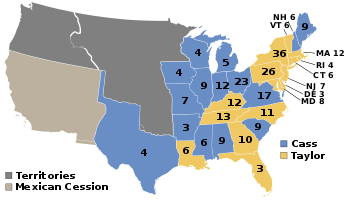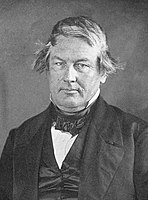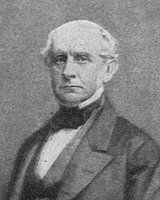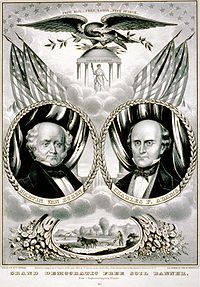1848 United States presidential election
Incumbent President James K. Polk, a Democrat, honored his promise not to seek re-election, leaving his party's nomination open.
The 1848 Democratic National Convention nominated Senator Lewis Cass of Michigan after former President Martin Van Buren withdrew his bid for a second term over a platform dispute.
After Webster turned down the vice presidential candidacy, Millard Fillmore received the party's vice-presidential nomination on the second ballot after defeating Abbott Lawrence, a Massachusetts politician whose mild opposition to slavery led him to be dubbed a "Cotton Whig".
An attempt was made to make both nominations unanimous, but it was unsuccessful due to Taylor's support for the Whig Party being seen as dubious.
The withdrawal of the Barnburners effectively removed former President Martin Van Buren, who had already become unenthusiastic about trying to win the party's nomination after the convention had voted to endorse a platform supporting popular sovereignty, from contention.
Senator Lewis Cass and Secretary of State James Buchanan were seen as the only serious contenders for the presidential nomination, with a draft effort also focusing on Supreme Court associate justice Levi Woodbury.
In stark contrast to the highly contested and protracted convention at the previous election, Cass held a wide lead on all four ballots, only being denied victory on the third due to the convention rules requiring a two-thirds majority, before the Buchanan and Woodbury campaigns quietly released enough delegates to allow Cass victory on the fourth ballot.
The Barnburners made a call for the formation of an anti-slavery party at their conclave in June, and by the People's Convention of Friends of Free Territory, which was organized by Salmon P. Chase, in Columbus, Ohio.
[4] Van Buren knew that the Free Soilers had not the slightest chance of winning, rather that his candidacy would split the Democratic vote and throw the election to the Whigs.
There, Senator John P. Hale was nominated for president over Gerrit Smith, brother-in-law to the party's previous presidential nominee James G. Birney.
Gerrit Smith was nominated for president with Charles C. Foote, a Presbyterian minister from Michigan, as his vice presidential running mate.
Whig campaigners, who included future presidents Abraham Lincoln and Rutherford B. Hayes, talked up Taylor's "antiparty" opposition to the Jacksonian commitment to the spoils system and yellow-dog partisanship.
In the South, they stressed that he was a Louisiana slaveholder, while in the North they highlighted his Whiggish willingness to defer to Congress on major issues (which he subsequently did not do).
Democrats repeated, as they had for many years, their opposition to a national bank, high tariffs, and federal subsidies for local improvements.
[10] The Free Soilers were on the ballots in only 17 of the 29 states with the popular vote, making it mathematically possible for Van Buren to win the presidency, but he had no real chance.
This was the last election in which Connecticut, Delaware, Florida, Georgia, Louisiana, Maryland, New Jersey, New York, North Carolina, Pennsylvania, and Rhode Island voted for the Whigs.
A study of the county returns reveals that Free Soil strength drawn at the expense of the major parties differed by region.
In the East North Central States, it appears at least the majority of the Free Soil strength was drawn from the Whig Party.
Conversely, in the Middle Atlantic region, Free Soil bases of strength lay in the areas which had hitherto been Democratic, particularly in New York and northern Pennsylvania.
The historian George Pierce Garrison famously quipped that "practically the only thing it decided was that a Whig general should be made President because he had done effective work in carrying on a Democratic war.












